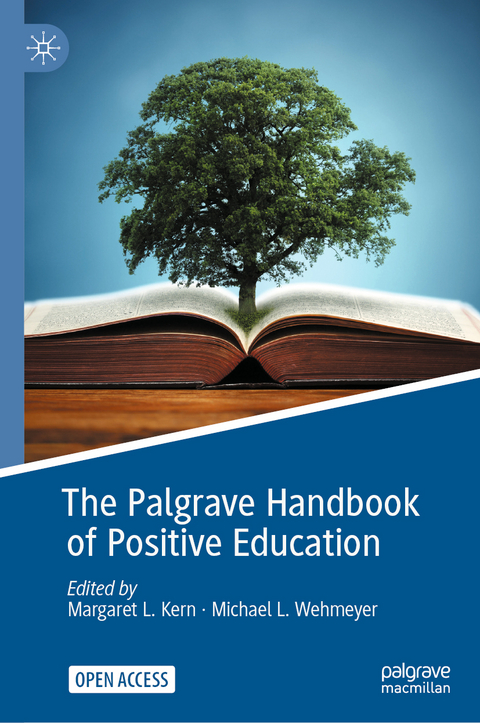
The Palgrave Handbook of Positive Education
Springer International Publishing (Verlag)
978-3-030-64536-6 (ISBN)
This open access handbook provides a comprehensive overview of the growing field of positive education, featuring a broad range of theoretical, applied, and practice-focused chapters from leading international experts. It demonstrates how positive education offers an approach to understanding learning that blends academic study with life skills such as self-awareness, emotion regulation, healthy mindsets, mindfulness, and positive habits, grounded in the science of wellbeing, to promote character development, optimal functioning, engagement in learning, and resilience.
The handbook offers an in-depth understanding and critical consideration of the relevance of positive psychology to education, which encompasses its theoretical foundations, the empirical findings, and the existing educational applications and interventions. The contributors situate wellbeing science within the broader framework of education, considering its implications for teacher training, educationand developmental psychology, school administration, policy making, pedagogy and curriculum studies.
This landmark collection will appeal to researchers and practitioners working in positive psychology, educational and school psychology, developmental psychology, education, counselling, social work and public policy.
lt;p>Margaret (Peggy) L. Kern is Associate Professor at the Centre for Positive Psychology at the University of Melbourne's Graduate School of Education, Australia. Dr Kern is Founder and Past-President of the Education Division of the International Positive Psychology Association (IPPA).Her research examines questions around who thrives in life and why, including understanding and measuring healthy functioning, identifying individual and social factors impacting life trajectories, and systems informed approaches to wellbeing. She works with schools and workplaces to examine strategies for supporting wellbeing, bridging gaps between research and practice. She has published 3 books and over 100 peer-reviewed articles and chapters. You can find out more about Dr Kern's work at www.peggykern.org.
Michael L. Wehmeyer is Ross and Mariana Beach Distinguished Professor of Special Education; Chair of the Department of Special Education; and Director and Senior Scientist, Beach Center on Disability at the University of Kansas , United States. Dr Wehmeyer is Publications Lead for the Education Division of the International Positive Psychology Association (IPPA). His research has focused on issues pertaining to self-determination, positive psychology and its application to disability, transition to adulthood, the education and inclusion of students with more extensive support needs, and technology use by people with cognitive disabilities. He has published more than 450 peer-reviewed journal articles and book chapters and is an author or editor on 42 texts.
Section I: Overview of Positive Education.- Chapter 1: An Introduction to Positive Education.- Chapter 2: Positive Education Around the World.- Section II: Core Goals for Positive Education.- Chapter 3: Wellbeing and Flourishing.- Chapter 4: Resilience.- Chapter 5: Social and Emotional Learning.- Chapter 6: Skills for the 21st Century Workplace.- Chapter 7: Approaches to Positive Education.- Section III: Foundations of Positive Education.- Chapter 8: Strength-Based Interventions in Educational Systems.- Chapter 9: Building Positive Emotions and Playfulness.- Chapter 10: Creativity and Intelligence.- Chapter 11: Growth Mindset.- Chapter 12: Perseverance, SelfC-control, and Grit.- Chapter 13: Engagement.- Chapter 14: Mindfulness, Meditation, and Related Practices.- Chapter 15: Relationships.- Chapter 16: Meaning and Purpose in Life.- Chapter 17: Civic Character.- Chapter 17: Moral Education.- Chapter 18: Trauma Informed Approaches.- Chapter 19: Reaching the Disadvantaged.- Chapter 20: Making positive education fun.- Section IV: Enablers of Wellbeing and Resilience.- Chapter 18: Self-Determination.- Chapter 19: Positive Youth Development.- Chapter 20: Career and Life Design.- Chapter 21: Assessing and Enabling Wellbeing in the Community.- Chapter 22: Teacher and Staff Wellbeing.- Chapter 23: Positive Leadership.- Chapter 24: Positive Communities.- Section VI: Applications and Implications.- Chapter 25: Systems Approaches to Positive Education.- Chapter 26: Cultural issues in positive education.- Chapter 27: Positive Education in Practice.- Chapter 28: Integration and Visions for the Future.
| Erscheinungsdatum | 26.06.2021 |
|---|---|
| Zusatzinfo | XXVIII, 777 p. 32 illus., 23 illus. in color. |
| Verlagsort | Cham |
| Sprache | englisch |
| Maße | 155 x 235 mm |
| Gewicht | 1370 g |
| Themenwelt | Geisteswissenschaften ► Psychologie ► Humanistische Psychotherapien |
| Schlagworte | Character Strengths Interventions • creative learning • Emotional development • Flourishing • grit • Mindfulness in education • open access • Playfulness • Positive education • Positive Emotions • Positive Organizational Scholarship • Positive spirituality • positive youth development • Resilience • Social and Emotional Learning • Social Work and Community Development • Strength-based Reflective Practice • Systems Informed Positive psychology • Teacher and Staff Wellbeing • Trauma-informed Approaches • Whole Child Approach to Education |
| ISBN-10 | 3-030-64536-3 / 3030645363 |
| ISBN-13 | 978-3-030-64536-6 / 9783030645366 |
| Zustand | Neuware |
| Haben Sie eine Frage zum Produkt? |
aus dem Bereich


